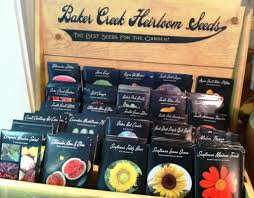
SEED LIFE, with JERE GETTLE, BAKER CREEK SEEDS, and more
Welcome to The Seeds Of September (or Seedy September) on – this week on Cultivating Place we kick off a four part series on seed with with Jere Gettle of Baker Creek Heirloom Seeds, based in Mansfield, MO. Jere and Baker Creek Heirloom Seeds are also founding organizers of the upcoming National Heirloom Expo taking place this year in Santa Rosa CA September 11 – 13.
In the second part of this week's program, we also revisit a conversation with Micaela Colley, Past Executive Director of the Organic Seed Alliance in Oregon, and Kalan Redwood, of Redwood Seeds - an independent grower in Northern CA - Kalan will be at the Expo in Santa Rosa, so if you attend make sure to stop in and say hi!
Enjoy the Seed Series and let me know what you think!
It makes sense if you think about it even momentarily – plants, landscapes, gardens – they begin with seed and they end with seed. Seeds are the alpha and omega of the plant world. The seed stage of the life cycle is the only time in a plant’s life when it is mobile, and when all of its genetic material and instructions are in one ingenious little travel pack ready and waiting for the right conditions to geminate the next cycle. As the old Welsh proverb goes: “A seed hidden in the heart of an apple is an orchard invisible.”
If you think about this even momentarily – the importance of seed starts to become clear. With the consolidation of individual seed growers into multinational corporations, fewer and fewer seed sources and seed varieties are available to the standard market buyer. Combine that with the advent in the last 75 years of seed law, seed patents and genetic modification of seed, and the state of the world’s seed bank - for habitat, for food, for utility, for the genetic diversity of the future - is in flux.
Seeds are foundational to us as gardeners, as eaters, as residents on this great planet earth with our fellow planet-mate species.
"So that’s the thing with seeds, there’s always these stories that go with them and personal notes and cultures re always exchanging - it brings cultures together around these traditional varieties which are now part French, part American and from Japan but originally probably came from Mexico, so it's a continual connection between cultures and continents."”
Jere Gettle, Baker Creek Heirloom Seeds
From Rareseeds.com: "Jere Gettle always had a passion for growing things, and at age 3 he planted his first garden. Ever since, he wanted to be involved in the seed industry. So in 1998, at the age of 17, he printed the first Baker Creek Heirloom Seed catalog. The company has grown to offer nearly 2,000 varieties of vegetables, flowers and herbs—the largest selection of heirloom varieties in the USA. Baker Creek carries one of the largest selections of seeds from the 19th century, including many Asian and European varieties.
The company has become a tool to promote and preserve our agricultural and culinary heritage. Our company and seeds have been featured in The New York Times, The Associated Press, Oprah Magazine, Martha Stewart, The Wall Street Journal, and many others. Gardeners can request a free color catalog. Our catalogs now distribute to over 700,000 gardeners nationally. Baker Creek started hosting festivals in 2000 as a way to bring gardeners, homesteaders and natural food enthusiasts together to exchange ideas and seeds, to listen to speakers and to enjoy vendors, old-time music and much more. These festivals gave birth to the idea for our pioneer village, Bakersville. Other projects include our trial gardens that we grow each year, seed collecting expeditions, and educational produce exhibits.
Over the last several years, Jere Gettle and his wife Emilee have branched out into other related projects, as well. They have also expanded into a location in Sonoma County, CA, in the beautiful town of Petaluma and are continuing with the restoration and preservation of the landmark Wethersfield, CT, Comstock, Ferre & Company, the oldest continuously operating seed company in New England.
The Gettles have published two books with Hyperion. These books feature heirloom vegetables and their work with seeds and food. After publishing The Heirloom Life Gardener in 2011, they released The Baker Creek Vegan Cookbook in 2012. Jere and Emilee also work extensively to supply free seeds to many of the world’s poorest countries, as well as here at home in school gardens and other educational projects. It is their goal to educate everyone about a better, safer food supply and fight gene-altered frankenfood and the companies that support it. We offer over 1800 fine varieties! Unique seeds from over 100 countries!"
* * * * * * * *
I find all these seed people to be real inspirations. I loved how Jere Gettle was a member of seed savers exchange by 16!
And the rivers of his Danish/German Grandmother and his Mexican grandmother coursing strongly in him – it reminds me how important the early childhood engagement really is – although it’s never too late to become a gardener – we know this as well.
I was inoculated early – one of my earliest memories – maybe I have shared this before, but a good story bears repeating – is of being underneath the potting table in the greenhouses of Berthoud Greenhouse in Berthoud Colorado. I could not be more than 3. My mother had gotten a part time job at the nursery, my father was completing his PhD in Wildlife Biology at Colorado State University in Fort Collins and my older sister would have been in kindergarten. I can see the loamy and perlite studded potting soil all around me, I can hear the sounds of women’s voices – smiling, happy, busy women and their chatting voices. It was warm and humid and to this day that combination of perfumes and sounds when I enter a healthy greenhouse brings my mother and a deep sense of wellbeing to me all in a one inhale rush. It’s perfect.
What about you – early or late inoculation? The other thing I love is this almost universal recall so many plants people have of their first seed – right?! Jere remembers, his – Kalan remembers hers and I loved hearing that too. I remember mine – nasturtium! What about yours? What was your first seed?
You know I’m going to want you to share with me – and you know where to share! Send me an email, send me a voice memo, leave a comment on this week’s post on Instagram or Facebook.
Join us again next week as the conversations and Seeds of/Seedy September continue next week when we speak with Ira Wallace of the Southern Exposure Seed Exchange and the upcoming Heritage Harvest Festival in Charlottesville, VA.
There are soooooo many ways people engage in and grow from the cultivation of their places.
Enjoy the Cultivating Place Podcast? If yes, SHARE IT WITH FRIENDS. The value of conversations like these is powerful action for positive shifts in this world.
And thank you!
PS: On a slightly different note – do you garden in the US West? You may have heard me speak about Pacific Horticulture Society, a 501c3 society of People Connecting to the Power of Gardens along the West Coast. Their going-on 50-year old publication known as Pacific Horticulture has been a treasure to me for the past decade! As a member of the Board of the society for the past few years, I wanted to share a discount code for membership to make sure you get this coming year’s programs and publications. If you go to PacificHorticulture.org and then to JOIN and use the code BOARDSPECIAL between now and September 15th you'll receive 20% off the normal membership price and ensure you get the printed fall issue of Pacific Horticulture. Enjoy!























